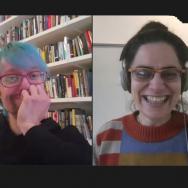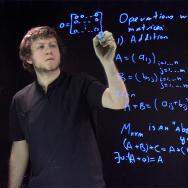Each May since 1987, the University of Chicago Scav Hunt has challenged teams of students and alumni to a sprint for points and glory, one unusual item at a time. During the coronavirus this year, organizers faced a new challenge for the distinctly UChicago tradition: adapting the four-day event to a virtual format.
“Scav is a gateway to some really incredible relationships and experiences, and I wanted as many people to be included in that as possible,” said third-year Sam Dulys, head judge of this year’s event.
With hundreds of participants and a record number of teams, this year’s hunt, dubbed “Scav 404,” fostered much-needed community in a time of social distancing. An advantage of going online was that it allowed people around the globe to participate, including a team of about 20 incoming first-year students in the College.
“In a time of isolation and uncertainty surrounding our daily routines and traditional rites of passage, we were eager to experience the camaraderie embodied within the spirit of Scav,” said incoming student Navid Mazidabadifarahani, team member of “The Prom Redeemers.” “For about a week, in the middle of AP exams, we suspended our concerns surrounding high school and dove headfirst into the UChicago community.”
At midnight last Wednesday, judges released a link on Twitch, which led teams to a series of hidden clues and five puzzles, that once solved, revealed a list of over 130 items. Among the bizarre items this year: “A dad joke captured in the wild, directly from the man himself” (0.3 points per unique father figure, 9 points max) to a DIY-haircut using a “fancy bowl with an uneven, artistic rim” (8 points).
One highlight was a live, single-elimination tournament where competitors assumed the rhetorical style and fashion sense of Socrates to debate questions such as “When is it OK to take an empty seat you didn’t pay for at a sporting event?” and “Do you need to tell a seller when they’ve undervalued an item at a yard sale?”
“I doubt there will ever be an event that is a better fit for me,” said third-year Anna Stoneman, who won the tournament for the Snell-Hitchcock team. “While philosophy debates are truly a staple of campus culture, they certainly don't often happen while toga-clad before an audience spread across the country. This event in particular, as well as Scav as a whole, very much captures what I love the most about the University of Chicago: the people, and the brilliant and engaging culture that they create.”
A common task and a common goal
With no prize other than making a mark in UChicago history, Scav continues to draw participants to exhibit their unique talents—or at least make bold attempts. Scav Judges create items that they hope are possible, no matter how improbable, and competitors rise to the challenge.
“Whether you’re collaborating with different people on your team, collaborating with different teams, or just talking to judges, you just so happen to meet so many people during Scav. It’s hard to feel alone when everyone is connected to each other,” said third-year Lynneah McCarrell, a captain for the Burton Judson team. “We care so much about the experience that we can’t help but be proud of what we make, no matter the outcome.”
For one item, participants connected for a cause. Traditionally, Scav hosts blood drive for the University of Chicago Medical Center. As an alternative, teams joined the distributed computing project Folding@Home to run simulations on viral protein structures that will aid in research for COVID-19, contributing over 5,600 work units total.
After four days, Scav Judges announced the winning teams. Burton Judson and GASH—the graduate student and alumni team—tied for third place, with Snell-Hitchcock taking second and Breckinridge House winning the title.
After their win, the Breckinridge team stayed on a Zoom call for nearly two hours to share their favorite Scav memories and catch up.
“Even though this year, Scav was different, it maintained its greatest quality: bringing people together,” said third-year Nastya Shvedova, a captain of the Breckinridge team. “Scav gave us a reason to work together again, gave us a common task and a common goal. It gave me a reason to create more memories with my friends, even though we are thousands of miles apart.”
—This article was first published on the University of Chicago College website

